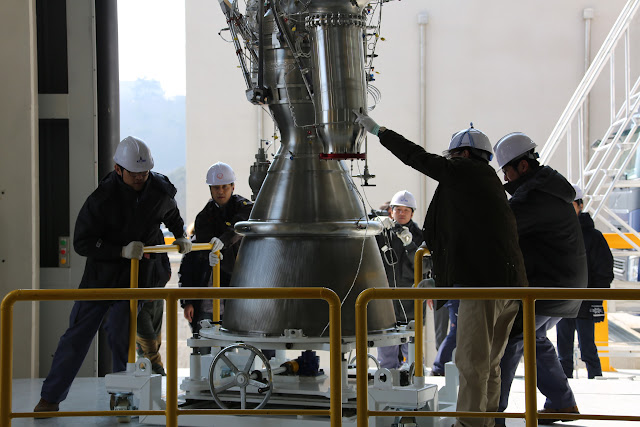KARI, succeeds in engine test fire for 75 seconds a 75-ton liquid-fuel
 |
| Credit: Korea Aerospace Research Institute (KARI) |
The Korea Aerospace Research Institute (KARI) has Successfully test fire a 75-ton liquid-fuel rocket engine for 75 Seconds which was conducted at the Naro Space Center in Oenaro Island, 485 kilometres south of Seoul, on June 9, 2016. According to KARI the fuel was successfully burnt off for 75 seconds as originally planned.
The institute said it will examine whether to conduct a 140-second test next time, the exact schedule of the next test has yet to be fixed. The goal is developing a locally-made rocket engine. In 2013, South Korea launched the KSLV-I space rocket, or Naro-I, from home soil, putting a satellite into orbit. However, it depended much on Russian technology. South Korea is working to develop an indigenous rocket that will be used for a project to land a spacecraft on the moon in 2020.
Sources: Korea Aerospace Research Institute, yonhap news, laughingsquid
---------------------------------------------
El KARI, prueba un motor de 75 toneladas de combustible líquido con éxito por 75 segundos.
El Instituto Coreano de Investigación Aeroespacial (KARI) a probado con éxito un cohete de combustible líquido de 757 toneladas, y que se realizó en el Centro Espacial de Naro en la Isla de Oenaro, a 485 kilómetros al sur de Seúl, el pasado 9 de junio de 2016. Según KARI el combustible fue consumido y usado por los 75 segundos como se planeó.
El instituto dijo que barajará si conducir o no un test de 140 segundos para la próxima ocasión, la fecha y detalles para la prueba están por confirmar. El objetivo es desarrollar un cohete propio con motor local. En 2013, Corea del Sur lanzo el cohete espacial KSLV-I, o Naro-I, desde suelo propio, poniendo un satélite en órbita. Sin embargo, este dependía mucho de la tecnología de Rusia. Corea del Sur trabaja en desarrollar un cohete nativo que se usaría en un proyecto para alunizar en la luna en 2020.
Fuente: Korea Aerospace Research Institute, yonhap news, laughingsquid
 |
| Credit: Korea Aerospace Research Institute (KARI) |
 |
| Credit: Korea Aerospace Research Institute (KARI) |
 |
| Credit: Korea Aerospace Research Institute (KARI) |
 |
| Credit: Korea Aerospace Research Institute (KARI) |









